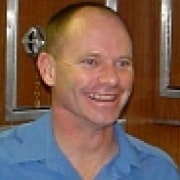Postcard from another planet
This week my letterbox contained an invitation to an information session at the Glen Eira Town Hall called “How the carbon tax hurts you”. The meeting featured the Victorian energy minister, a panel of small businesspeople and other local Liberal MPs. About 50 residents came along on a cold night.
It was no doubt like many other public meetings being convened by Coalition members around the country as part of their political campaign against the carbon tax. It was interesting to sit and listen to the claims being made and the real fear in the questions from the audience, who clearly believe the economy sits on the edge of a precipice.
The meeting had been inspired by a local café owner who calculated he would have to sell an extra 56 lattés a day to pay his carbon tax bill. These fears were not downplayed – in the words of Elizabeth Miller, the Member for Bentleigh, “On July 1st the lives of all Victorians change forever.”
A Stonnington Councillor said the tax would “hurt everyone in Australia.” His council faced an increase of $3.1 million in electricity costs (albeit over 10 years). Their only option was to cut services or increase rates – most likely by adding 1 per cent to next year's rise. He did concede that the council had invested in energy efficiency measures which had a four year payback, but did not consider this would reduce pressure on rates.
For him, “every garbage bin is now a tax collection point.” Another $1 million would be charged “for 40 years” on the annual waste disposal cost, adding another $11 per person to the family rates. He complained that “the compensation that is being advertised is not aimed at the sort of people who live in Stonnington.”
A local printer calculated his electricity bills would go up by $1,426 or 7 per cent using a formula which he said “discriminated against Victorian businesses” because it included a higher factor for emissions. The “multiplier effect” of costs from suppliers meant the impact on his prices would be substantially more. Yet, he had one hand tied behind his back because the ACCC legislation prevented prices being increased by more than was justified. The carbon tax, he said “was just a way to take money from our pockets.”
The manager of a large charity group said his costs were expected to increase by $20,000 for electricity and $70,000 for increased costs from suppliers. After the first year apparently this would force “closure of 100-200 kindergarten places and 25 mentoring opportunities for young people.” He predicted other not-for-profits would be more heavily impacted because they currently only just break even.
The chair described his presentation as “scary”.
The energy minister, Michael O'Brien, set the broad context that the Victorian government supported a 5 per cent reduction in emissions, provided it was based on “environmental effectiveness at least cost” and delivered affordable electricity with reliable supply. He focussed on long standing investments in carbon capture and storage and renewable energy funding for hydro, wave and geothermal power, but argued that wind and solar were intermittent and couldn't replace brown coal.
His main point was that Victoria would be “hit first, and hardest by the carbon tax”. However, the Commonwealth modelling used to make this point seemed to say that the impact on Gross State Product would only be -2 per cent over the next 30 years.
The consequences would be “35,000 lost jobs in Victoria alone, $6.6 billion in lost investment, a reduction in personal incomes of $1,050 a year and a $660 million hit to the annual state budget.” He helpfully broke this down to exactly 420 jobs to be lost in Glen Eira and 524 in neighbouring Kingston to make the point.
He said eight million Australian households would pay more than they receive (which is really everybody, because the ABS census in 2006 recorded a total of 7.8 million households in Australia).
The increased $6 million annual cost for schools was “money that could have gone to a teacher's pay rise”; the $13.6 million cost for hospitals would mean “fewer emergency operations next year” and the $48 million cost for public transport (over three years) could have bought new trams. His estimate of the council rate rises was up to 3.3 per cent.
The organisers had obviously been expecting trouble as participants had to pre-register to gain admittance and somehow two policemen had been secured to maintain order.
However, no Greens or protesters turned up. If anything the rhetoric during the question time was more apocalyptic than the speeches. Many foresaw closure of businesses, flight of capital and Australia going into economic decline. One called it a “suicidal policy for small business” and claimed “the people who get the most compensation don't want to work anyway.”
Two questioners said they felt the tone of the meeting had been too negative. One pointed out that she reported street lights left on during the day but the Council did nothing to eliminate waste. Another, more boldly, rebutted the source of some of the statistics and argued that the health and environmental consequences of brown coal needed to be added into the equation. He was quickly put in his place.
The only solution offered was a change of government in Canberra. Michael O'Brien reassured the audience that there was “no reason the tax can't be withdrawn by Parliament” – although he conceded legal contracts were “a different kettle of fish”.
Ms Miller sent the audience home hoping the meeting had “opened their eyes and ears.”
Andrew Herington is a former Labor Ministerial Adviser now a Melbourne freelance writer.
















